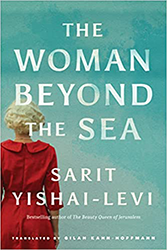If you’re expecting a book entitled Motherhood to be warm and fuzzy, you’re likely to be disappointed. In her new novel, Heti’s narrator (also named Sheila and also a writer) is not out to extoll the experience of being a mother but to question it, examining it from every angle in order to decide whether or not she should have a child.
The book follows the narrator’s internal dialogue as she attempts to determine her life’s path while also examining the past. She reflects on the stories she heard as a child about her ancestors who were killed in the Holocaust. She consequently understood that sometimes there is no future for a family. Perhaps her own family would live through her books, rather than a child, in the next generation.
A reader assumes many of the details are autobiographical, so the line between fiction and nonfiction is porous. Heti’s parents, like her narrator’s, are immigrant Hungarian Jews, now divorced; her mother is a pathologist, her father an engineer. Heti, like her narrator, married young and later divorced. She now lives with her partner, a lawyer, in Toronto.
The story opens when Sheila is almost thirty-seven, and ends when she is almost forty. At the beginning, she tells us she is someone who lives in her mind, not in her relationships — which, given the daily reality of child-rearing, doesn’t seem like a recommendation formotherhood. She also has the personal example of her own mother, who put all her energy into her work, not her family.
Sheila agonizes over the life-changing decision of having a child, which, for her, may not be all that others say it is. So she turns the question over and over — sometimes literally flipping coins. Her partner already has a child and doesn’t especially want another, although he’ll agree to it if she really wants one. But does she? On the one hand, on the other hand. What if this, what if that. Why should she, why shouldn’t she.
One might want to respond to all the back-and-forth with, Sheila, you’re overthinking it! Yet, how can one overthink a decision that, once made and enacted, will last forever? At the same time, Sheila wonders, “How much has my deliberation won me in terms of the path of my life?”
Motherhood is a book for Heti’s generation and younger, not yet sure where they fit (or don’t fit) in today’s society, and how far outside societal expectations they can go. It’s written at a moment when personal choice has become a supreme value, and the individual is at the center of all decision-making.
In her struggle, Sheila has been Jacob wrestling with God, and in the end, “I named this wrestling Motherhood, for here is where I saw God face-to-face, and yet my life was spared.”





